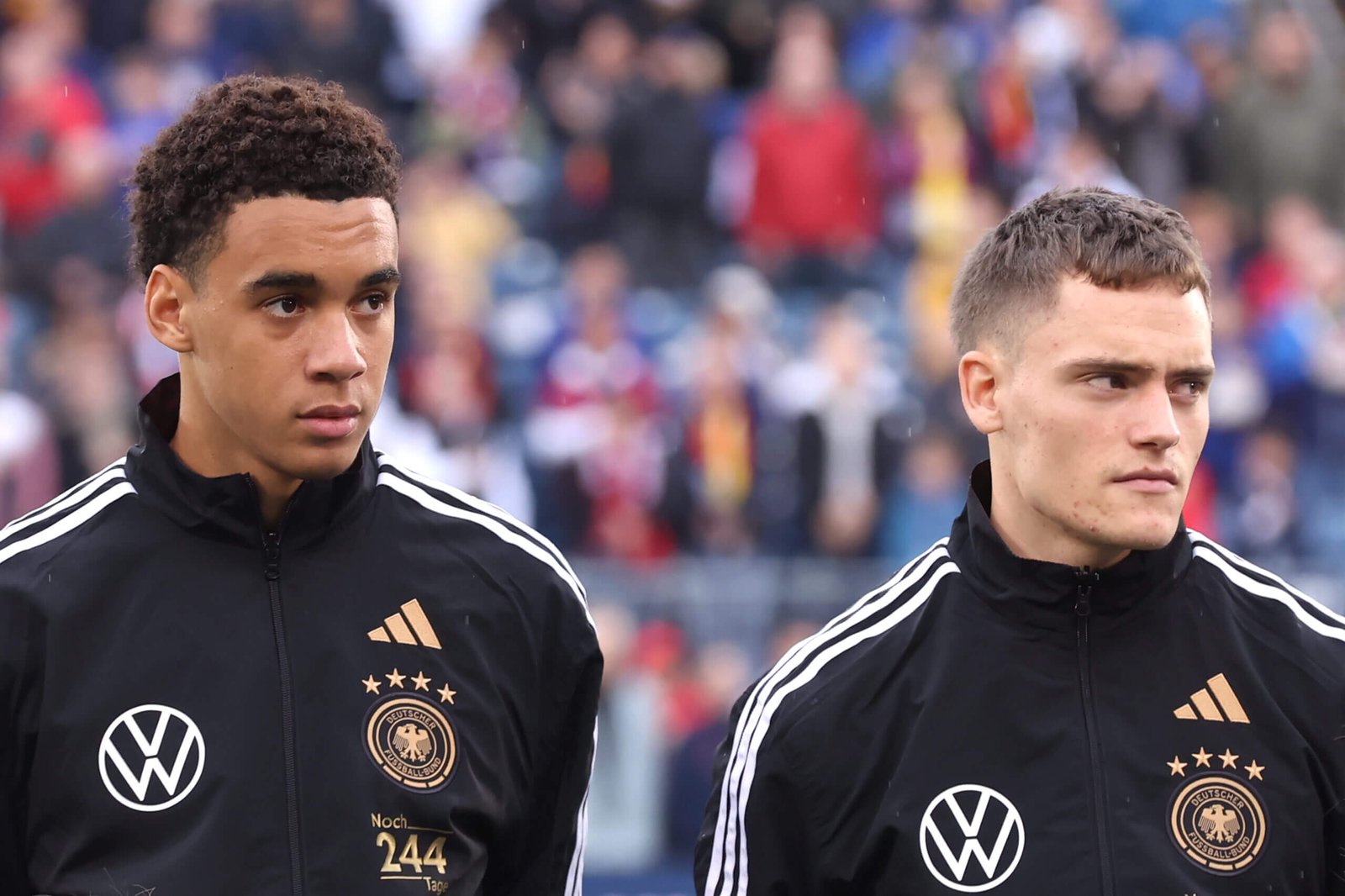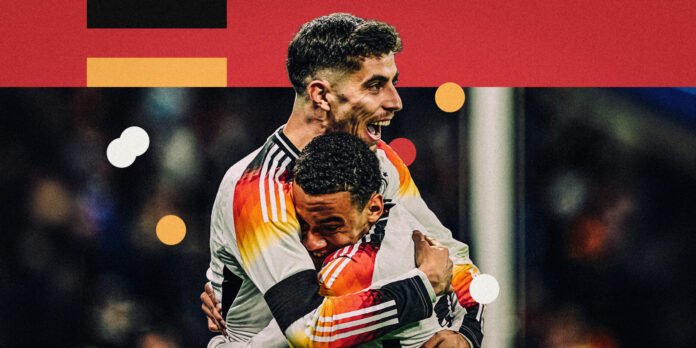After much soul-searching, 2024 European Championship hosts Germany appear to be back on an upward trajectory under Julian Nagelsmann, with the spotlight on their thrilling attack rather than the lack of defensive depth.
The manager
It’s strange to talk of a 36-year-old manager or head coach as being in a career recovery phase — and perhaps that is too strong a term — but Julian Nagelsmann is certainly on the rebound after leaving Bayern Munich. Until that sacking in March 2023, Bayern had just seemed like the natural next step of his ascension. It was not to be. Amid grumbling about his clothes, his temper and, in one instance, his skateboarding, the shine came off the penny when he was fired just 18 months on from his appointment.
The gleam is back now, with Nagelsmann responsible for changing the mood around the national team. Disinterest and disengagement had been growing since their 2014 World Cup triumph, in response to scandal and underperformance, and relations fractured further during the most recent World Cup in Qatar two years ago, which many Germans simply ignored.
Back-to-back wins against France and the Netherlands in this year’s March international break have started something, though, and while not quite reaching the neighbourhood of impending euphoria, Nagelsmann’s quick, vertical football and creative selections have ushered in a new era of open-mindedness.
Germany will play a 4-3-2-1 this summer. They will be ambitious with the ball and use their inverted full-backs inside. Toni Kroos is back for one last hurrah before retirement from playing the game, which changes the calibre of possession in midfield. Behind false nine Kai Havertz, Nagelsmann will also employ twin No 10s: Jamal Musiala and Florian Wirtz.
This could be fun.
Nagelsmann extended his Germany contract until 2026 in April (Alexander Hassenstein/Getty Images)
The household name in waiting
By virtue of his story, Maximilian Mittelstadt. His career has taken off over the past 12 months in a way that nobody could have foreseen and which, most likely, will make him sidebar fodder for journalists this summer.
This time last year, Mittelstadt had just been relegated to the second division with Hertha Berlin. They were awful, finishing bottom of the Bundesliga, and he was unremarkable. But in July, he joined Sebastian Hoeness’ Stuttgart for €500,000, and became part of one of the most dramatic turnarounds in German football.
Hoeness took Stuttgart from last season’s relegation play-off to runners-up and Champions League qualification within a year and Mittelstadt, an inverting, wandering left-back, emerged as a member of one of the most potent flanks in the Bundesliga.
And he was in the right place at the right time.
Mittelstadt is not the best German left-back in the country, but he is the ideal component for Nagelsmann. He has taken his chance, too. He scored a brilliant goal against the Dutch in March and, more broadly, he has a fearless commitment to moving the ball forward that makes him enormously fun to watch.
Strengths
Musiala and Wirtz together. Go back a few months and this was seen as a problem. Yes, Germany had two world-class young players. Unfortunately, they both played the same position. It was a Steven Gerrard-Frank Lampard situation from England’s recent past, with one player expected to be compromised for the sake of the other.
Except unlike various England managers, Nagelsmann has made it work.
The pair were in perfect harmony in those March friendlies and the combination of their vision, ball-carrying and general threat, conducted by Havertz’s intelligent pivot play further forward, will make them one of the most dangerous tandems at the tournament.
If Germany go a long way in these Euros, this dynamic will likely be why.

Attacking midfielders Musiala and Wirtz should both start for Germany (Alex Grimm/Getty Images)
Weaknesses
Where have all the German defenders gone?
One of the more existential debates in the country concerns a dwindling number of specialists. Germany’s coaching reinvention at the turn of the century helped produce a small army of technical and versatile players, but — some argue — at the cost of the game’s more traditional components, such as centre-backs or No 9s.
The Germans know how to make Mario Gotzes. Can they still bolt together a Jurgen Kohler or a Miroslav Klose?
It is just theory, but a look at the squad seems to say not.
Germany have enough craft and vitality to see them through at the top of the pitch, but the centre of defence has been a problem for years and its deficiencies are still making supporters nervous.
Jonathan Tah is their best out-and-out defender. He was terrific at the heart of Bayer Leverkusen’s near-unbeaten season, and Antonio Rudiger starts most Real Madrid games for good reason, but Nagelsmann will have to spend the tournament protecting what looks like a thin department.
How to follow Euro 2024 on The Athletic…
Thing you didn’t know
Who remembers Peter Schilling’s 1983 hit Major Tom? You would know it if you heard it, especially if you have been watching TV drama Deutschland 83.
Anyway, back in the spring, after video of Wirtz’s first-minute goal against France had been set to Major Tom by an X user, a petition started to use it as goal music at these Euros.
It caught fire… until UEFA spoiled the fun. Nope. Only officially approved goal music can be used during the tournament, it said, and everybody rolled their eyes.
Nevertheless, Major Tom lives, and means Schilling is enjoying a bit of a comeback at age 68. The DFB, Germany’s football association, had trialled using Major Tom as goal music — ‘torhymne’ in German — during that friendly against the Netherlands in Frankfurt. Stuttgart’s Mittelstadt marked his second cap with a rasping drive that went in off the crossbar, his first international goal, and Schilling’s hit came booming out of the speakers.
In a rare PR win, the DFB used non-traditional media to leak out the squad announcement for the Euros, player by player, and Schilling, who originates from Stuttgart, starred in his own Instagram vignette confirming Mittelstadt’s place.
Song of the summer? Maybe.
Expectations back home
It is amazing how quickly things have changed. Go back as little as six months and there was not even a hint here in Germany that it was going to be hosting a major football tournament this summer. There was even trepidation towards it: the country feared embarrassment on the pitch, but also worried that the rest of Europe would point and laugh at its creaking transport systems. The Deutsche Bahn train network has been a mess for a long time and the prospect of millions of new people depending on it to get around the country to watch games was not something to look forward to.
Trademark German efficiency? Not quite.

The European Championship trophy on display in Munich’s Allianz Arena (Alexandra Beier/AFP via Getty Images)
But how different things look now.
Nagelsmann’s side are not expected to seriously contend for the title, but — rather like when Germany hosted the 2006 World Cup, two years on from group-stage elimination at the Euros — there is some hope that they can put a bold step forward and that, even if they do eventually get upended by a France, an England or a Portugal, these players can at least advertise what may lie in their future.
There is a humility to this squad, too, and perhaps that helps.
Nagelsmann has selected on form and was not afraid to leave out big names from the biggest clubs (there is no Leon Goretzka or Serge Gnabry from Bayern, no Mats Hummels, Julian Brandt, Niklas Sule or Emre Can from Borussia Dortmund).
The result is a team dosed with a couple of ageing players for whom there remains plenty of affection, some growing stars who are obviously destined for the moon, and a couple of others who really deserve this moment, and for whom, as a result, there is a lot of goodwill.
(Top photo: Getty Images; design: Eamonn Dalton)
Read the full article here


